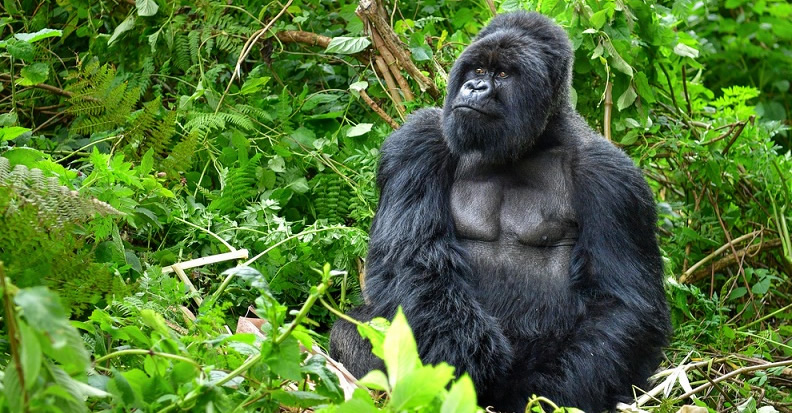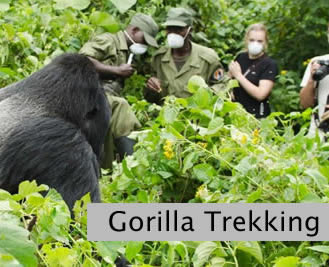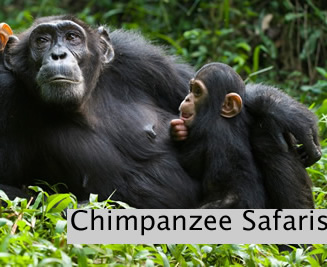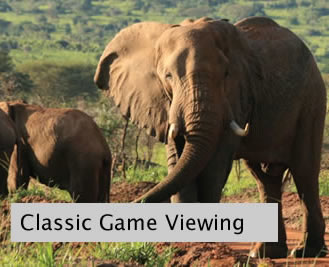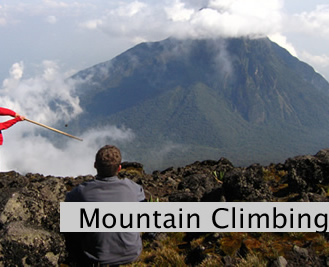Up in the high Virunga Mountains at the borders of Rwanda, DR Congo and Uganda lives the great giants the mountain Gorillas. They live in Bwindi impenetrable forest, Volcanoes and Virunga National Parks. They live in large groups/families led by a dominant male known as a silverback, which directs the rest on the day-to-day activities as the adult females dominate the young ones. The gorilla’s gestation period is about 8.5 months and gives birth to one or two babies just like human beings. This normally happens once in four years and that’s why their number hardly grows. The baby gorillas weigh half of the human babies at the time of their birth with about 2.5kgs. Female Gorillas are grown by age six and can mate while males are mature at age ten. At this stage, their backs start turning grey and they start rebelling dominant silverback and leave the group to start their own families/group.
A large percentage of the young gorillas normally die due to accidents in the kind of environment they live in and also due to the death or departure of the dominant silverback in the group. A new dominant silverback in the group normally kills the young babies to keep its genes only in the group.
Diet of the Gorillas
Gorillas’ daily meals consist of roots, leaves stems and fruits. They are naturally vegetarian though they occasionally feed on ants and insects. The bamboo shoots are their greatest diet in particular times of the year. A mature male gorilla can eat up to 20 kgs of green vegetation a day and the silverback normally enjoy the greatest opportunity and rights to feed more than the rest.
Breeding in Gorillas
The dominant silverback has mating rights over all the males in the group; it is criminal for other makes to have sex with females and could cause fights.
The social life of the Gorillas
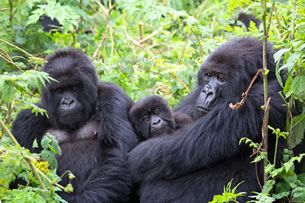 Gorillas begin their day in the early morning hours at around 6:30 when they can see and start their feeding in this time till they around the mid-morning hours and take some rest to digest their full bellies in the afternoon. The mature gorillas lie as they rest as the juveniles continue to play running around in the watch of the silverback. They sleep in nests constructed in the evening hours by each of them. The babies stay with their mums in their nests until around age three when they become a little independent from their mothers.
Gorillas begin their day in the early morning hours at around 6:30 when they can see and start their feeding in this time till they around the mid-morning hours and take some rest to digest their full bellies in the afternoon. The mature gorillas lie as they rest as the juveniles continue to play running around in the watch of the silverback. They sleep in nests constructed in the evening hours by each of them. The babies stay with their mums in their nests until around age three when they become a little independent from their mothers.
Gorilla Habituation and tracking
Habituation of gorillas involves getting them used to the presence of human beings. They are trained to maintain their natural behavior even in the presence of visitors that come to visit them. Mountain gorilla habituation experience is only done in Rushaga sector south of Bwindi Impenetrable Forest National Park. The 2-3 years experience is an extended version of gorilla trekking and it’s the first stage all gorilla families go through before they are opened for trekking. A single permit for gorilla habituation experience costs $1500 issued by Uganda Wildlife Authority. Gorilla tracking has become one of the biggest tourist activities in the East African region especially in Uganda, Rwanda and DR. Congo where the Gorillas live.
Where to do gorillas live?
Mountain gorillas reside in Bwindi Impenetrable Forest and the Virunga Conservation Area shared by Volcanoes National Park in Rwanda, Virunga National Park in Congo, and Mgahinga Gorilla National Park in Uganda. It’s only in these four national parks that travelers can visit and trek the endangered mountain gorillas. These four National Parks shelter 1006 mountain gorillas half of which live in Bwindi Forest National Park. Altogether, there are 36 habituated gorilla families in the whole world, 18 families in Uganda, 10 in Rwanda and 8 in the Democratic Republic of Congo. Gorilla trekking in both destinations is exceptional but you can trek in both countries for comparisons.
Cost of Gorilla Trekking in Africa
The costs of gorilla tours in Uganda, Rwanda and the Democratic Republic of Congo is not static. Each gorilla tour itinerary comes with different costs based on where you trek the gorillas, how many days, which kind of accommodation you choose and the number of people in your group. Regarding the cost of gorilla permits; Rwanda apparently sells the most expensive gorilla permits at $1500 each. In Uganda, gorilla permit prices depend on a traveler’s nationality. A Uganda gorilla permit costs $700 for foreign nonresidents, $600 for foreign residents and UGX 250,000 for East African residents. The Democratic Republic of Congo sells the cheapest gorilla permits at $450 each making it the best gorilla safari destination for budget travelers.
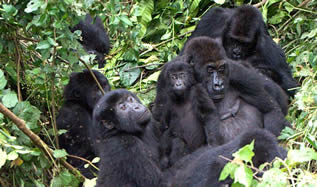 Best Time to Visit gorillas
Best Time to Visit gorillas
Dry season in the months of June, July, August, and December through February is the best time to trek gorillas in Uganda, Rwanda and Congo. During this time, there are less or no rains which make it easy to trek through the jungles. Travelers intending to trek gorillas in the dry season are advised to book for permits early due to high demand. However, you can trek gorillas in the wet season in the months of March. April, May, October, and November. Trekking in the wet season is a real adventure with difficult hikes through jungle forests. Fortunately, service provides such as lodges, hotels and transport companies normally give discounted services in the low season to encourage travel.
Gorilla Permit bookings
African Apes Tours helps you book and reserve gorilla permits in Uganda, Rwanda and Congo. Booking a gorilla permit through African Apes Holidays saves you time and hustles associated with permit bookings. After telling us about your desired travel dates, we check with UWA the availability of permits and reserve for you. Gorilla permit calls for a deposit fee of 30% and the balance is required 3 months to the trekking date. Alternatively, gorilla permit booing can be done directly with responsible bodies, which are Uganda Wildlife Authority in Uganda, Rwanda Development Board in Rwanda and the management of Virunga National Park.
A visit to these endangered apes in their natural habitat is a lifetime experience that you must include on your bucket list.

